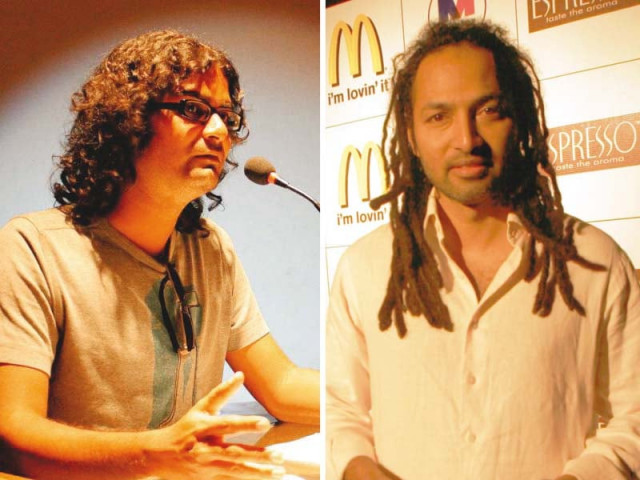Can we say no to piracy?
Napa observes World Intellectual Property day to address the rampant issue and its impact on local music industry.

Musicians Asif Sinan (L) and Immu (R) were amoung those who took part in the discussion.
Moderated by US Consul General Brian Heath, the event boasted a panel, which included musicians Imran Momina (Immu), Asif Sinan, American band Grace McLean and Them Apples, lawyer Zain Sheikh, and EMI Pakistan’s general manager Zeeshan Chaudhry. Immu, Fuzon’s keyboardist, began the session by an impassioned plea, emphasising the wide gap between making music and selling music. “Unfortunately for us, we have serious pirates in Pakistan. People need to understand that you can’t just steal from artists,” he said.
He feels that musicians are suffering due to piracy. “You will see that there is a budget for almost every aspect of production, such as the actor’s fee and director, but there is never any for musicians,” he added. According to Chaudhry, the problem is more deep-rooted than it appears to be and in order to get the artists paid, radio stations would need to start paying music companies as well. “95 per cent of the radio and TV stations are not paying royalties. And when they are not paying us, we are unable to pay the artist. Many of us say that we love our artists but I think it’s about time we start compensating them,” he said.
Sheikh, who is an intellectual property expert, said artists also need to be aware of their rights, as many musicians don’t know that they are entitled to certain rights even when performing live. However, not everyone was of the opinion that piracy is something completely wrong if looked at from a different perspective because if an artist’s work was being downloaded, then it meant there was a demand for that kind of music or musician.
On how the artist can address the rampant issue of piracy, Ryan Vaughn, member of Grace McLean and Them Apples, noted musicians can only thrive if a “new system” is established. He also acknowledged that piracy can work both ways as it can inspire upcoming musicians but can also reduce their value. Although the downloading culture is prevalent throughout the world, Sinan shared the reason behind its potency in Pakistan. He attributed this to how, apart from two or three stores, there are no proper archives available, which lead to downloading, which offers free access. He also emphasised the need to educate the upcoming generation about the downside of digital downloads.
Immu also had an intense debate with Chaudhry on the current commercial state and future of the music industry. Chaudhry revealed that the strategy to improve things is under progress and that, with the cooperation of radio stations and TV channels, the first Pakistani performing rights’ society has been created to bring about a change.
Published in The Express Tribune, April 28th, 2015.
Like Life & Style on Facebook, follow @ETLifeandStyle on Twitter for the latest in fashion, gossip and entertainment.



















COMMENTS
Comments are moderated and generally will be posted if they are on-topic and not abusive.
For more information, please see our Comments FAQ